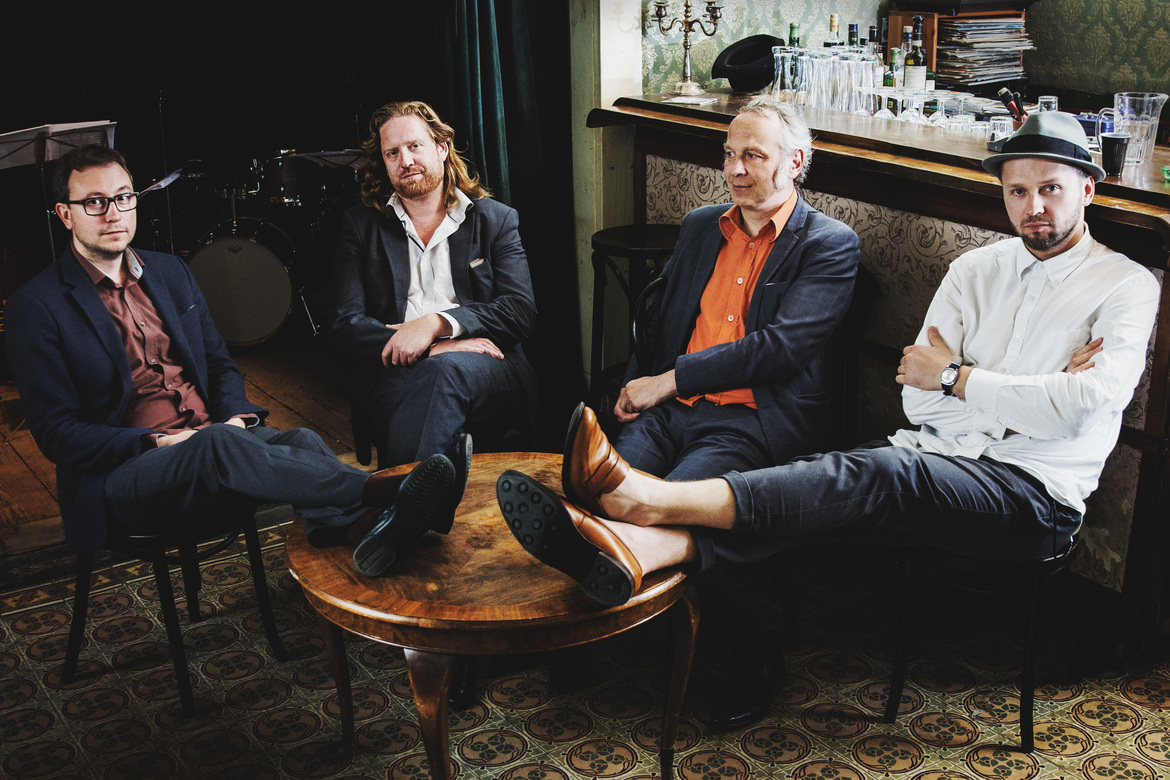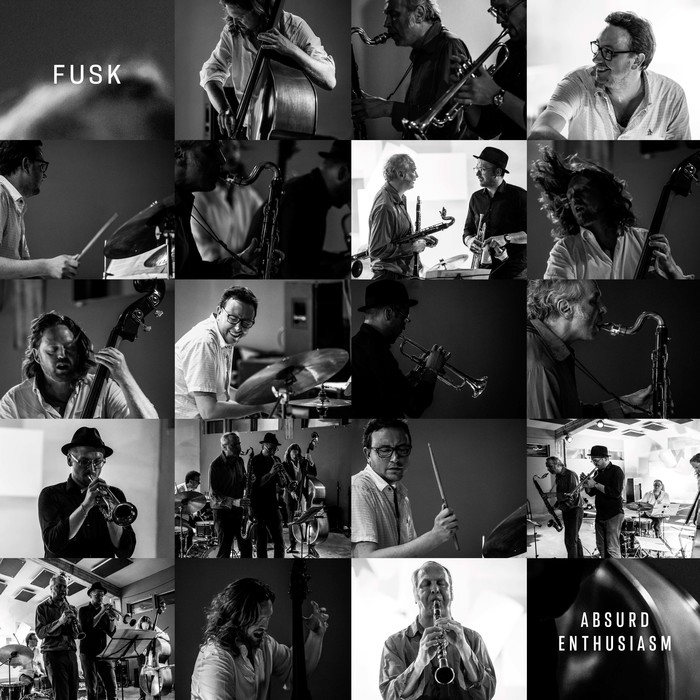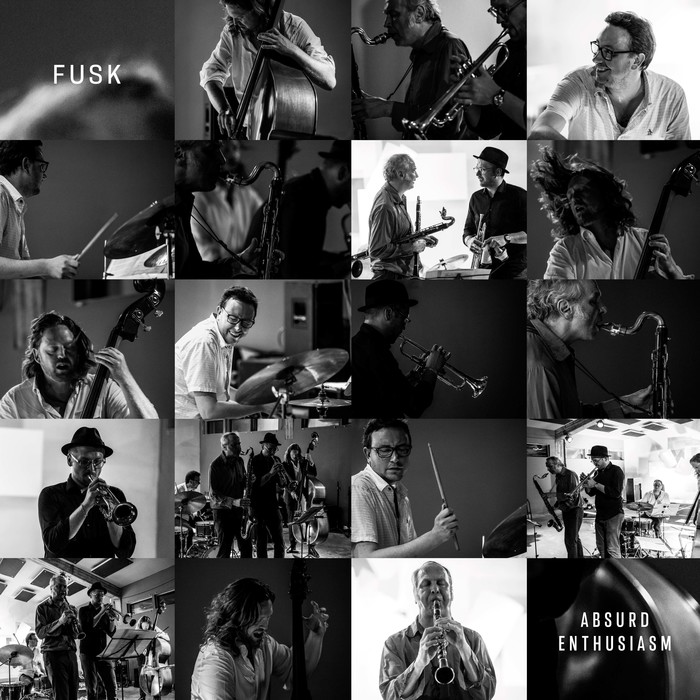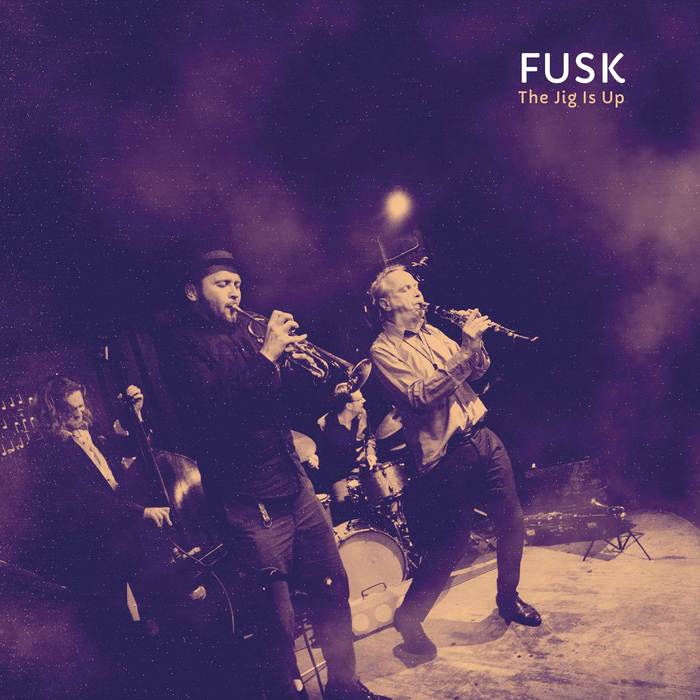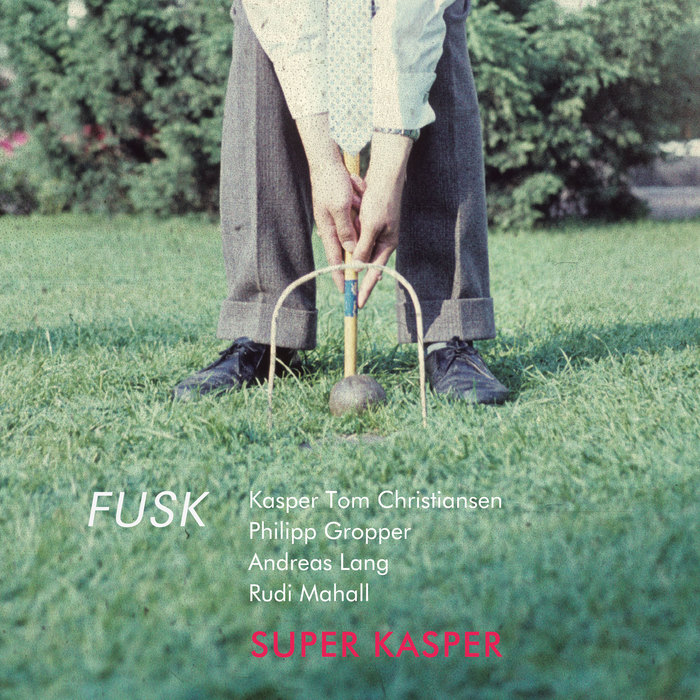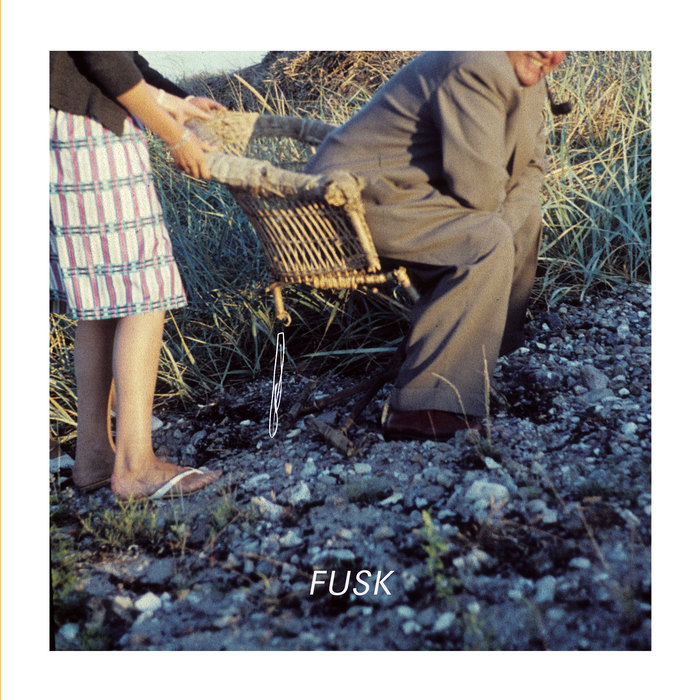Danish drummer and FUSK bandleader Kasper Tom Christiansen has a wonderfully unique stylistic slant on his instrument. He’s no purist; instead, he tastefully mixes genres, as much at home with the techniques required in contemporary new music as with the improvisational surprises of free jazz.
This acoustic band has fun with the album’s feel of freewheeling swing. There’s often a tongue-in-cheek attitude to the music’s mercurial, gripping shifts and turns. It’s fresh music that plays around with the sounds we are used to hearing, as the musicians tip their hats to the Avant-garde of the 60’s, while at the same time blasting through those self-same styles. Kasper Tom and Andreas Lang define the way today’s rhythm section should sound, while bass clarinetist/clarinetist Rudi Mahall and trumpeter Tomasz Dabrowski celebrate their musical conversation as spiritual brothers.
“FUSK makes you happy” was one critic’s conclusion. For another critic, the band “sets free a weightless depth and joy, followed by a passion to play; our lives should be accompanied more often by such multi-layered soundtracks as these.” Absolutely! Weighty and feather-light at the same time, the music is made to sound effortless, as the difficult is transformed into artful exhilaration, with the players dancing around the rules of the game. The poet Karl Mickel got it right: “If it’s not fun, it’s no fun.”
Releases
Concerts
Sie sind Veranstalter und möchten FUSK für ein Konzert oder Festival buchen? Verfügbarkeit: auf Anfrage.
Audio/Photos/Videos
Reviews
The group's music originated in the style that emerged with Ornette Coleman's piano-less quartet in the late 1950s but with a more European and contemporary sound.
The style is pure and unmatched jazz with equal [...]. They are down to address the roots of jazz, where a collective, organic and wide-ranging expression creates the foundation that FUSK stands on. The strong composite set fits the quartet's slightly dry acoustic sound and melodic freedom. FUSK is an overall whole, where it will not make sense to highlight a musician rather than another. It makes sense to emphasize Kasper Tom as a jazz musician and band leader who, like a organic farmer, grows the soil without the use of pesticides or other environmentally harmful means.
[...] the album shows a pleasant, light-hearted and retro vein, animated by the bass clarinets of the German Rudi Mahall and the Polish trumpet Tomasz Dąbrowski, and supported by the smiling and dynamic Danish rhythm section [...]. In general, it is a good work, whose look at the past sometimes colors the sounds of a nostalgic melancholy.
FUSK has been working now for ten years, refining its witty and inventive aesthetics. Its fourth album, «The Jig Is Up», continues the quartet’s playful-adventurous journey, moving freely between eras and genres throughout the history of jazz, from the dance-based, New Orleans-ian melodies to the most advanced, extended techniques of free improvisers. [...] FUSK’s open yet tight rhythmic interplay and its generous space for personal, even eccentric, ideas and interpretations of the themes may bring to mind the seminal free jazz bands of the early 1960’s as the classic Ornette Coleman Quartet, the New York Art Quartet, or Archie Shepp’s early quartet with trumpeter Bill Dixon. But, today, two generations later, FUSK does not suggests a retro-nostalgic journey into a glorious past, nor it offers a musical revolution against today’s musical conventions. FUSK strength lies in its sober and ironic perspective, often equipped with compassionate humor.
Music of today, which could have been created in the sixties, that is the sound of the music of Fusk. [...] Christiansen is responsible for the fresh, lively compositions that invite to exuberant improvisations. Again, the quartet puts the listener on the wrong track, because how much fun the music radiates, control is always present. No loud extravaganzas, electronic violence or other tyrannies; Fusk is a purely acoustic company, in which the musicality injected, in which technical ingenuity, however, is not an end in itself. On the contrary, it is about lively music that comes to light with a lot of feeling. [...] What The Jig Is Up has to offer: melodic compositions and improvisations, playfulness and fun. This quartet breathes jazz from all pores and this album should appeal to many jazz lovers.
As usual, the music is based on highly complex and yet wonderfully melodic themes, which Christiansen so ably creates, which in turn provide ideal platform for the quartet members to develop their individual and collective statements. [...] The scope of the compositions, and as a result the scope of the music presented on the album is very diverse, which creates an element of tension with the listener not sure as of what to expect next. [...] For an experienced Jazz connoisseur this album is a lecture of Jazz, and especially Free Jazz history, delightfully illustrated by the music. Not surprisingly it is a wonderful piece of music, which should be enjoyed by as many listeners as possible and another milestone in Christiansen´s path, which is one of the most consistently excellent on the burgeoning European Jazz scene. Hats off, again, Maestro!
Danish drummer Kasper Tom Christiansen refers unequivocally to the bubbling period of the early years when the Ornette Coleman Quartet, The New York Art Quartet, or Archie Shepp's quartet with Bill Dixon invented a new way of playing jazz. [...] The leading drummer has cut his tailor-made compositions for his accomplices by adding enough open spaces for their freedom of expression. We enjoy the very natural patina of this music that makes wood, copper, string and skin vibrate with sobriety and authenticity. A music that flows from source and traces a path often chaotic with moments of serenity. If the reference to the past is very sensitive, these musicians remind us that this approach to jazz will always be new. Highly recommended!
The music of “FUSK” is full of contrasts and dynamic stylistic changes. The four interesting and creative avant-garde jazz masters are playing together for a long time now – their collective improvisation is a marvelous synthesis between expressive and passionate improvising, spontaneous musical decisions, original and interesting stylistic waves, sudden turns and colorful contrasts. The main attention is paid to the expressive, free and vivacious improvising and the search of new and unusual ways of playing. Kasper Tom Christiansen's compositions are arranged very inventively and expressively – each musician can explore new ways of playing and show his own style, abilities of playing and interesting playing manners. [...] This album has a bright, innovative and touching sound.
This album is a superb example of contemporary modern European Jazz developed and created by a young generation of greatly talented individuals who are lucky to grow up in the affluent borderless Europe, which enables a much wider access to musical education and international cooperation than just a few decades earlier. These young musicians are able to size the moment and exploit this new reality, which results in an explosion of young international groups playing Jazz and Improvised Music all over the continent.
Christiansen, who has been recoding music both as a leader and a sideman for several years before forming FUSK, established his position as one of the leaders of this new European scene, playing extensively with Scandinavian, German, Polish and other young musicians and additionally developing his skills as a composer, which came to full fruition with FUSK. Here he presents his most adventurous works and the quartet turned out to be an ideal vehicle for exploring his music. He is one of the relatively few drummers, who are bandleaders and principal composers in their ensembles.
As a team Christiansen and Lang are one of the strongest and most imaginative rhythm sections on the European scene and this album is full of wonderful examples of their telepathic interplay. Supported by such an excellent rhythm section the two soloists are able to spread their wings and explore the freedom of improvisation in full. Both Gropper and Mahall gently weave their lush structures, both individually and collectively, creating a highly aesthetic whole.
Overall this is an exciting and wonderful album from start to finish, full of surprises and one that keeps the listener on his toes from start to finish. Considering the fact that it is a debut recording, the result is even more commendable. Well done indeed!
The music presented here emphasizes the freedom and openness in his compositions, which are based on short melodic themes which are then explored by the quartet quite liberally and without limitations. Of course even if the music is mostly improvised, both harmonically and rhythmically, it is neither chaotic nor disorganized, keeping well within the boundaries of group improvisation. The quartet members obviously listen to each other attentively and support each other constantly. There is an overall feeling of tenderness and respect and none of the aggression often associated with group improvisation is present here. The individual performances are all first class, with the two soloists obviously standing up front most of the time, but with the rhythm section firmly involved as well. Lang´s bass and Christiansen´s drumming are an excellent example of superb contemporary rhythm section work, which is nonabrasive and nonaggressive and yet keeps the music moving forward on a solid track.
FUSK [...] holt die wilden 1960er-Jahre in die turbulente Jetztzeit, zeigt, wie fließend die Grenzen zwischen frei Improvisiertem und Notiertem sein können. Trotz aller Retro-Tendenzen klingt die Musik dieses Vierers unverbraucht, frisch, aufregend. Übersetzt heißt „Fusk“ übrigens zu viel wie „Pfuschen“. Doch davon kann auf dieser CD nicht die Rede sein.
FUSK defines its own freedom, between contrapuntal springboard melodies, sometimes bordering on serial techniques, and catchy themes that employ hard-swinging rhythms, joint improvisations and expressive deconstruction of patterns, all performed with passionate playfulness and wise irony. [...] playful interplay, true to the spirit of this excellent quartet. Funny, inventive and provocative.
Leader Kasper Tom C. has managed to found a quartet utterly distinguished by the personalities of the players... and Kasper's energetic, rollicking vision of how a band can swing wildly and be filled with outside expressiveness throughout. This new album is even better than the last. Listen and you will be transported to a Super Kasper-land, a very good place to be indeed.
[...] Joe Lovanos Statement „Ich spiele nicht Free Jazz – ich spiele Jazz free“ machen sie sich zu eigen. Explosiv und dynamisch preschen sie durch die kompositorischen Vorgaben des Schlagzeugers Christiansen. Mit dieser zeitgemäßen Auffassung einer freien Spielweise, übersprudelnden Ideen und ungekünstelter Lebendigkeit definieren sie ihren Platz in der improvisierten Szene auf sehr eigenständige Weise.
FUSK doesn’t so much play free jazz, as set jazz free. Performing Super Kasper in a series of first takes, with three tracks presented as complete improvisations, this amalgam is simply too enterprising to fit into any one category. Call it FUSK jazz, if you like. [...] the group sets a tone of expectation-melting excitement [...] Pulse-quickening without slipping into hyperactivity, arhythmical without losing a sense of propulsion [...] Hair-raising, and then harrumphing...a raw, layered, madcap experience [...] endlessly intriguing [...] FUSK ends things with a moment of crackling interplay – showing once again their willingness to move outside of every convention we have about “outside” playing.
[...] this is a massive step forward. Challenging chords, imaginative thinking and superb performances. [...] The real thing that struck me from the first listen to Super Kasper was how many times I kept coming back to the record throughout the first week I got it. Fusk is a quartet of veteran musicians. But a quartet that has matured in its compositions and performances faster than you would expect. I really really loved this record. And it will be one of my best of albums of the year. Highly Recommended!
Super Kasper by Fusk is a pivotal album in the world of avant-garde jazz and improvisational music. Throughout the album, Fusk proves that avant-garde jazz is engaging, quirky, fun, and odd—all at the same time. [...] there is a poetic grace about the music, which screams innovation [...] Super Kasper is an interesting and productive work of musical art that should incite praise and adoration from avant-garde, improvisational, free jazz, and nu-jazz forms.
FUSK macht glücklich! So soll Quartett-Jazz sein: im Drive nicht zu bremsen, die Melodien klar konzipiert, aber nicht ausgedacht - und aus allen Knopflöchern quillt feiner Humor.
I presume that the new Fusk is even more mature proposal and will gain at least as high marks as the debut. Personally, music on Super Kasper warms me up so much that I might jump into the glacial this time of year Spree river to cool off a little bit and finish my bath in the vicinity of the Mühlendammschleuse floodgate after 55’26 seconds, because winter is a pretty hot season with this music.
Fusk is an album of multiple ideas brought in from previous group experience. But where this quartet shines is that they are thinking one step ahead of their some of their European counterparts in that you once you’ve learned from your influences–what will you do with it. Fusk shows that you can do a lot. Enjoy…
Ebendieses Album setzt, selbst durch miserable Boxen, Kopfhörer und Anlagen, eine schwerelose Tiefe und Freude frei, gefolgt vom Begehren, das eigene Leben sollte öfters zu vielschichtigen Soundtracks wie diesem verlaufen.
What impresses me about this one is the total leverage of the unit. They kick the music with some torque and have well-poised forward movement. It's the kind of new jazz that takes the impetus of Ornette's early ensembles and the emerging masters of that era, like Simmons, Dolphy, the NY Contemporary Five, early Don Cherry and the Dixon-Shepp unit, and goes someplace new with that. They do a very good job at it. If you like the propulsed freedom of the giants that came before, you will find something new to like with Fusk. Recommended.
"Fusk" (fudge) - plain and simple, but not in that sense. Bandname and title of the debut record are the same. But not at all is the music ”fudge”. The young Danish drummer Kasper Tom Christiansen has during his Berlin settlement had the privilege of being joined in his quartet by one of Germany's most prominent jazz soloists, Rudi Mahall - with sax player, the young, also German, Philipp Gropper and his Danish partner from the berlin-base, Andreas Lang. A surprisingly strong group with an own sound, which especially depends on the original reed players - but also on the organic pulsating ”carpet” the Danes on bass and drums propagate, as the basis for creativity in the music. Christiansen has written some exceptionally strong themes, often in two-part, intricate lines, that the group turn and twist for all their melodic substance. In the group's melodic and tonal soundscape you hear kinship with the music of Joe Lovano, Ornette Coleman, Charlie Haden and Don Cherry's Complete Communion. So one doesn't long for "a good solo." But luckily they come - in full bloom along with many duo improvisations by the two reeds. Mahalls Baroque and edgy markato playing contrasts interestingly to Gropper's pronounced legato playing with the special matted and at times guttural tone on the tenor sax. Both are captivating improvisers who often intercept ideas from each other or from the thematic presentation. On the harmonic and rhythmic side there is Lang's bass, at once solidly supportive and open for solistic movement, and on the drums Christiansen is a tailored and fiery turmoil and commentator, as he is obviously the general for the refreshing variations in tempi and rhythmic patterns that pervade several tracks. In two collective free improvisations the group wisely keep track of direction and with sharp attention to each other's movements, seize the potential of dialogue and contrast. But the melodic value of themes and solo playing is undeniably the group's hallmark. For example the initial riff-styled and Coleman-like Ein Kopf Kaffe, bitte, and the harmonically long streched swinger Berliner Bratwunder plus the beautiful hymn-like November and the strongly cantabile Kammiena Wola in 5/4-time. The German-Danish quartet is, regardless of the name, a group that plays carefully embellished music, one would like to hear more of.
FUSK is one of those bands that creates a modern, innovative, new form of jazz, appropriate to the 21st century [...] Indeed, you can look forward to great music [...] they represent the best acoustic jazz in Europe.
FUSK moves in the area of tension between composition and improvisation in an original expression that is indicative of an orchestra that plays music with a very communicative approach. (...) Communication is always an important aspect in music, but positively in FUSK it is practiced as one of the absolute key parameters in the artistic expression. (...) Overall FUSK requires concentration and openness - but with this as the basis, the debut album is quite interesting, and I can imagine that a live concert by the quartet can be an exciting and inspiring experience.
The Danish drummer Kasper Tom makes his debut with a strong, well-toured and precise, hard-hitting album, that in a wonderful and off-centered way unites Germany and Denmark. Tom has good connections to the neighboring country south of the border, which explains the appearances of the Berlin based saxophone-comet Philipp Gropper and Rudi Mahall on bass clarinet. Moreover, the eminent bass player Andreas Lang provides Tom with great support. The group freely sets out from modern, experimental jazz and finds a consistently, captivating combination of abstract improv and hard-swinging interplay – not least thanks to Tom himself. At more times the individual tracks offer downright outstanding solos, played at a really high level. It is extremely competent and imaginative, but also acquires an open-minded listener, when the most avantgardistic elements fill the sound scape. 5 stars (out of 6).
But for those who do comprehend avant-garde jazz, it can be quite a pleasure to hear left-of-center musicians playing the type of music they enjoy instead of catering to a program director or a marketing department. And that play-what-you-feel-in-your-gut ethos is very much at work on this self-titled album by Fusk, a European avant-garde jazz quartet consisting of leader Kasper Tom Christiansen (who is from Denmark and writes most of the material) on drums, Berlin-born Philipp Gropper on sax, Denmark native Andreas Lang on upright bass and German-born Rudi Mahall on bass clarinet (...) Saying that Fusk would rather reflect and contemplate than confront is not to say that this album is without passion. There are plenty of passionate moments here. But the thing is that when Fusk decides to blow off some steam at times, they will build up to it rather than giving the listener scorching chaos from start to finish. There are some chaotic moments on “Eins Zwei Polizei”, “Ein Kopf Kaffe, Bitte” and the quirky “The Attack of the Überpea”, but it isn’t the sort of nonstop chaos and relentless sensory assault that the more extreme artists in jazz’ avant-garde are known for. Nuance is not a mere afterthought on this album, but an integral part of what Fusk do. And it should also be noted that Christiansen, Gropper, Lang and Mahall have a strong sense of teamwork on this album. The four of them are very much in sync, and together, they achieve a genuine group sound; they give the impression that they went into the studio with a sense of purpose.
(...) also was die Bassklarinette für Töne von sich gibt, während der Mann mit den Gummibeinen hineinbläst, ist unglaublich, ekstatisch, schräg, irgendwie hätte John Cage seine Freude dran gehabt. Wir natürlich erst recht. Einfach wunderbar … Denn wenn die Bassklarinette und das Saxophon das melancholische gemeinsam ihrem melodischen Rhythmus folgen, bläst es den ZuhörerInnen die Perücke weg (...) Rhythmisches Zusammenspiel, phantasievolle, manchmal melancholische Soli, schräge Töne: Was will man mehr.
